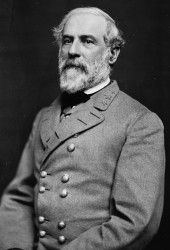Robert Edward Lee (January 19, 1807 – October 12, 1870) was an American and Confederate soldier, best known as a commander of the Confederate States Army.
He commanded the Army of Northern Virginia in the American Civil War from 1862 until its surrender in 1865.
A son of Revolutionary War officer Henry "Light Horse Harry" Lee III, Lee was a top graduate of the United States Military Academy and an exceptional officer and military engineer in the United States Army for 32 years. During this time, he served throughout the United States, distinguished himself during the Mexican–American War, and served as Superintendent of the United States Military Academy.
When Virginia's 1861 Richmond Convention declared secession from the Union, Lee chose to follow his home state, despite his desire for the country to remain intact and an offer of a senior Union command. During the first year of the Civil War, he served as a senior military adviser to Confederate President Jefferson Davis. Once he took command of the Army of Northern Virginia in 1862, he soon emerged as an able tactician and battlefield commander, winning most of his battles, nearly all against far larger Union armies.Lee's two major strategic offensives into Union territory ended in defeat. His aggressive tactics, especially at the Battle of Gettysburg, which resulted in high casualties at a time when the Confederacy had a shortage of manpower, have come under criticism in recent years.Lee surrendered the remnant of his army to Ulysses S. Grant at Appomattox Court House on April 9, 1865. Since Confederate Congress had appointed him supreme commander of Confederate armies, the remaining Confederate forces capitulated after his surrender. Lee rejected the proposal of a sustained insurgency against the Union and called for national reconciliation.
In 1865, Lee became president of Washington College (later Washington and Lee University) in Lexington, Virginia; in that position, he supported reconciliation between North and South. He accepted "the extinction of slavery" provided for by the Thirteenth Amendment, but publicly opposed racial equality and granting African Americans the right to vote and other political rights. Lee died in 1870. In 1975, the U.S. Congress posthumously restored Lee's citizenship effective June 13, 1865.
- quotations /
- quotes by Famous People /
- Robert E. Lee
